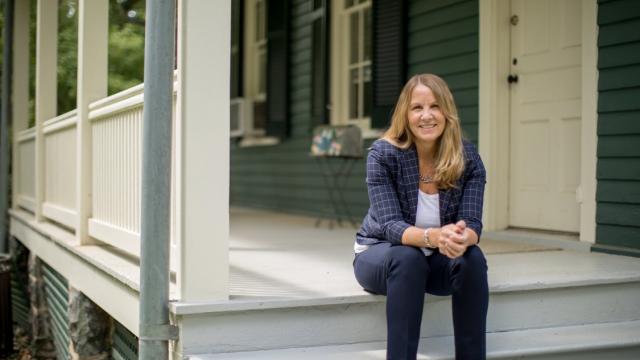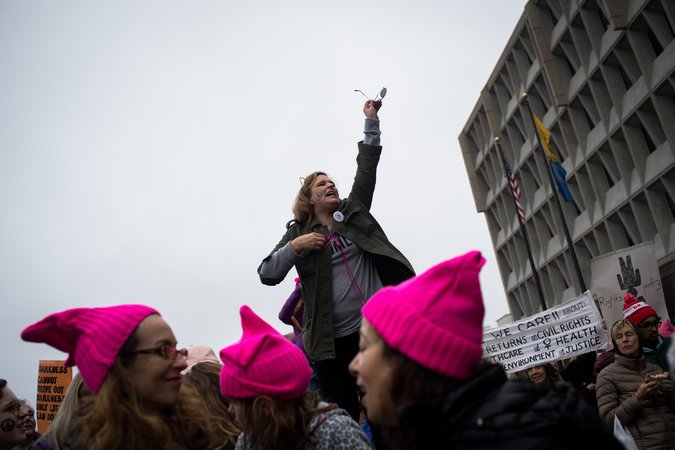
For Wendy Gooditis, a Northern Virginia real estate agent, the crystallizing moment in her decision to run for office was when she heard her state delegate suggest that he had fought gerrymandering in Virginia when his record said otherwise.
For Mai-Khanh Tran, a pediatrician in Southern California, it was the day after the presidential election in 2016 and she looked into the eyes of a young patient with a brain tumor whose family had only recently obtained health insurance.
For Andrea Ramsey, the president of a nonprofit children’s health clinic in Kansas City, Kan., it was in May when her local congressman voted to repeal the Affordable Care Act.
None of the women had seriously contemplated entering politics before. They had no money or organization. But they were dismayed with the direction of the country, they said, starting with the election of President Trump, and finally decided to act.
They have been joined by hundreds of other women across the nation, with the number seeking elective office rising at every level, according to the Center for American Women and Politics at Rutgers. They were angered by Mr. Trump’s election and energized by the Women’s March in Washington the day after his inauguration, and are now even more driven to get involved after the flood of sexual harassment allegations against powerful men.
Stephanie Schriock, the president of Emily’s List, the largest national organization devoted to electing female candidates, said that in the 10 months before the election in 2016, about 1,000 women contacted her organization about running for office or getting involved in other ways. Since the election, she said, the number has exploded to more than 22,000.
“We have never seen anything like what we have seen over the last 12 months,” Ms. Schriock said. “If you could underline that four times, that’s what I mean.”
Ms. Gooditis won her race for the Virginia House of Delegates in November, defeating a three-term Republican incumbent, Randy Minchew. She was one of 11 women who flipped seats in Virginia state legislative races, and women across the country took notice of the wave.
Democrats are the overwhelming beneficiaries of the surge in women’s activism, and even hope it could lead to retaking the House if candidates like Ms. Tran and Ms. Ramsey prevail over incumbent Republicans.
Their optimism will be tested in primaries early next year and throughout the summer, but the early signs indicate that female candidates are raising significant sums and building strong organizations.
“If you look at 2017, I think it becomes an historic year of the woman,” said Anita Dunn, who served as communications director for President Barack Obama.
She said it began with the Women’s March, where the scale of the movement showed great potential for continued engagement. “Then the year is ending on this note of women who are stepping forward, finding their voices, in many ways doing the classic ‘we are mad as hell and we aren’t going to take it any more.’ It’s sort of a primal scream.”
The largest increase by far is in the number of female House candidates — 354 — which includes 291 Democrats and 63 Republicans, according to data from the Rutgers center. The number of women challenging incumbents is almost four times the number at the same period in 2015.
In the Senate, there are almost double the number of female candidates — 25 Democrats and 13 Republicans so far — than there were at this point in 2015, and about 10 times the number in the 2012 and 2014 elections.
Celinda Lake, a pollster for Democratic candidates, said: “I think we will see more women running, more women voting for women, more women turning out to vote. It makes women change agents and a powerful part of the formula for 2018 races.”
Mr. Trump’s defeat of Hillary Clinton, the first woman to be a major-party candidate for president, jolted women to become more active.
“It was Donald Trump and the way that he sort of embraced masculinity, but even more specifically, misogyny, in his rhetoric and behavior,” said Kelly Dittmar, a scholar at the Center for American Women and Politics. “To make a statement against that and the policies he espoused sort of pushed them over the edge to not just think about running, but to put their names out there.”
The number of male candidates has also increased, she said, so the proportion of female candidates has not ballooned. But many of those women are running as challengers, meaning that if they win, they would substantially alter the balance of power in statehouses and Congress.
The revelations about sexual assault and harassment have only added to the power of the moment. “Look, these instances, by and large, almost entirely, are being perpetrated by men, and there is something to say here about the value of having women in institutions like Congress to challenge the dominance of masculinity,” Ms. Dittmar said.
“I don’t think that it is a partisan story,” she added. “Republican women as well as Democratic women equally know what it is like to be harassed.”
Many of the women are decided long shots, challenging Republicans in some cases where no Democrat has run in a decade.
Hillary Shields’s activism had been limited to preparing scrapbooks of families who struggled to gain access to health care, and to work for the Kansas City, Mo., chapter of Indivisible. “I had never thought about running for office,” she said. But when she asked her county Democratic organization who was running against the Republican incumbent for the State Senate, it told her that no one was, and that Democrats had not fielded a candidate for the seat since 2006.
The incumbent suddenly retired, forcing a special election. Ms. Shields lost, but is running again in 2018. “I just felt like I had to get more involved,” she said, adding, “If we feel like we are doing something positive and useful, people will show up.”
Samantha Fields felt a similar pull in Lubbock, Tex. After seeing her local state representative introduce a bill allowing for the open carrying of swords, she had had enough, and decided to become a candidate. “Women tend to want things that they need, and I hear him for this bill for something that he just wants,” said Ms. Fields, a Democrat. “There’s such a lack of women in the Texas Legislature now.” Men hold 144 of the 181 seats.
The results in the House of Delegates in Virginia, which included the election of the first Latinas, the first Asian-American and the first transgender candidate, provide the most tangible indication that women are poised to make substantial gains next year.
“I have been experiencing this surge since the day after Election Day last year,” said Julie Copeland, executive director of Emerge Virginia, which is part of a national network of organizations that helps train female candidates. “What I didn’t know is if it would stay. I can say that it has. The women are energized and they are engaged and they are looking for a place to go.”
It did not take Ms. Gooditis long to find her path. She was distraught about Mr. Trump’s election, and could not bring herself to watch the inauguration. She attended the Women’s March and a week later started an Indivisible group.
After hearing Mr. Minchew imply at a town hall meeting that he opposed gerrymandering, she said, she later told a local gathering of Democrats, “Somebody has to run against this guy.” Then, she added, her neighbor Kathy Smart said, “You run, Wendy.”
“And everybody started yelling, ‘You run, Wendy,’” Ms. Gooditis said, “and my husband started poking me, and then, I guess, I am in.”
On April 30, she had $700 in a campaign account and no staff. By Election Day she had a staff of eight and had raised almost $500,000. She defeated Mr. Minchew by about 1,000 votes out of more than 29,000 ballots cast.
Ms. Tran, who was born in Vietnam and came to the United States when she was 9, attended Harvard, where she worked as a janitor to help pay for school before eventually entering the Dartmouth-Brown Program in Medicine.
On the day after the election, Ms. Tran, a pediatrician for 25 years, said she did not feel like going to her medical office. “But I did what most women do: get up, take care of things and take care of people,” she said.
One of her first patients that morning was a child with a brain tumor whose family had only recently been able to obtain coverage through the Affordable Care Act. She said she thought that “now is really the time to stand up and fight and protect the people we care about.”
She added, “I think it’s time that we speak up, get involved and get a seat at the table.”
Ms. Tran is one of five Democratic challengers so far to Representative Ed Royce of California, but the only woman. “Women are ready to be at the table now on issues that are so current and vital to women now,” she said. “Our health care, our reproductive rights, also our safety and our dignity.”
Ms. Ramsey, who oversaw the children’s health clinic after careers as a lawyer and business executive, said she would happily be working there today if Mrs. Clinton had been elected president. But Mr. Trump’s victory emboldened Republicans like Representative Kevin Yoder of Kansas to push to repeal the Affordable Care Act.
“I was not going to abide that vote,” Ms. Ramsey said. “It crystallized my decision to step up and run.”
She has raised nearly $450,000 so far, she said, and will have to win a primary in August to face Mr. Yoder. But the results from Virginia “put some wind beneath our wings,” she said.
“Women are stepping up and winning,” she added, “and I would say that injected a dose of additional enthusiasm into our campaign.”
While health care is a dominant issue for many of the female candidates, and was the top issue cited by voters in Virginia, according to exit polls, it is the president who may be the prime motivator.
“I just say as long as Donald Trump is in the White House, there will be oxygen in this movement,” Ms. Dunn said.
Originally published by The New York Times
3 WAYS TO SHOW YOUR SUPPORT
- Log in to post comments















